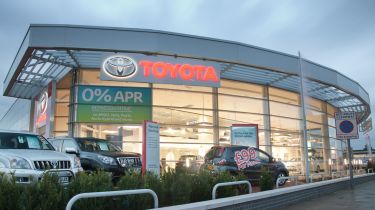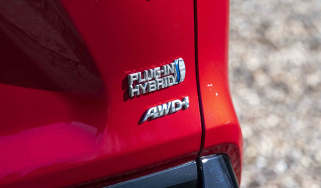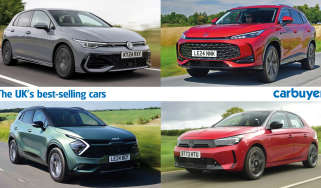Where to buy a used car: dealers, websites, brokers and private sales explained
You have several options for where to buy a used car – we cover the pros and cons of each

Deciding where to buy a used car is one of the most important things to consider when shopping for a second-hand set of wheels, but it’s not always entirely straightforward.
Not so long ago, buying a used car was as simple as visiting your local dealership and picking a model that you liked the look of. Today, with used car brokers, online sales platforms, car supermarkets and more, buyers have a wider choice than ever before, but it can make the process a bit more confusing. The right place to buy a used car will depend on a number of factors and different solutions will be better suited to different people. That’s why we’ll cover all of them in this guide.
 Buying a pre-registered car: top tips
Buying a pre-registered car: top tips
No matter which route you take to buy a used car, it’s always vital to do your research. Spending some time to figure out the right car for you and hunting around for a good deal will reduce the risk of ending up with a car that you’re unhappy with.
Then it’s a case of balancing the level of service you’ll get against the price being asked for the car. If you want the piece of mind that comes with a professionally serviced and prepared vehicle with a long warranty from a reputable franchised dealership, it’s probably going to cost more than a similar car in a private sale without much protection or aftersales support.
Deciding where to buy your used car is all about weighing up the whole package against what’s available elsewhere, so it’s best to take your time and put in some effort to build a good picture of your options.
Now let’s look at the main places to buy a used car in detail.
Private sales
Pros
- Low prices
- Lots of choice
Cons
- Time-consuming research needed
- Risk of scams
Private sellers are the backbone of the used car market – car owners who, for whatever reason, want to sell their vehicles and advertise them directly to prospective buyers.
Today, there are many online classified car sales sites where owners list their cars for sale. Popular choices include AutoTrader, eBay and Facebook Marketplace. Generally, a car sold privately will be cheaper than the same car sold by a broker or a dealership, as there’s no middleman involved with overheads and the need to make a profit. The cars for sale also tend to be older and at the more affordable end of the market.
With those low prices, however, comes a greater degree of risk. There’ll be no warranty unless some of the manufacturer’s cover is still left to run, and there may be some work that needs doing. You should know what you’re looking for if you choose to buy privately; make sure to ask the right questions and perform the essential used car checks. It’s a case of buyer beware to ensure that you don’t fall into any expensive traps and the more expensive the car, the greater the risk.
While there are plenty of reputable sellers out there, the private used car market is also a haven for scammers, unscrupulous individuals who will try a whole range of tactics to trick you into parting with your cash. It’s worth clueing up on common used car scams, including everything from fake adverts made with somebody else’s pictures to false descriptions and even demanding a deposit before you’ve arranged to see the vehicle.
People will also sometimes try to sell a car with a hidden past. So whatever vehicle you’re interested in, you should always perform an online check to ensure that it lines up with the description attached, and has no outstanding finance payments. You can do some checks for free on the DVLA’s website where the car’s MOT history is available – providing an insight into any areas that need attention and how it’s been maintained, as well as its recorded mileage when each MOT was carried out. Then there are various more detailed HPI check services offered online that can flag all kinds of other problems. For more expensive cars, paying for a professional inspection of the vehicle by an expert may also be a good investment.
Independent dealerships
Pros
- More customer protections than a private sale
- Warranties
- Cars should be well-prepared
Cons
- Some dealers are better than others
- Choice can be limited
Independent car dealerships are found all over the country, and will specialise in different types of cars. Any car dealership without a franchise from a new car manufacturer is classed as an independent, but some will be small single-site operations and others will be part of larger groups. The levels of service on offer can vary greatly but buyers can expect good quality cars that have been well prepared, and sold with some kind of warranty cover. No used car dealer is obliged to provide any vehicle with a warranty, although many will offer a package via a third party in the name of competitiveness.
One key benefit of buying a used car from an independent dealership is that you’re protected by a universal set of rules that all dealers must comply with – whether you’re buying a £1,000 runabout or a £100,000 supercar. The most important of which is the Consumer Rights Act, which provides used car buyers with a level of protection should the car not be as described. If the vehicle is found to be faulty, you have the right to reject the car for a full refund within 30 days of buying the car. If you find a fault within the first six months, you have the right to a repair or replacement, and the retailer is given the choice of which remedial action to take.
Of course, there are good independent dealers and bad ones so tread carefully. It pays to do your research beforehand and to check reviews from other customers – good feedback is far more valuable than a fancy showroom or posh signwriting. You may find it’s worth travelling a bit further to visit a standout dealership with a great reputation. Accreditation by the AA or RAC may also seem to add credibility to an independent dealer, but remember that recognition by those organisations only means that the dealer is required to undertake an inspection and offer vehicles for sale that meet an agreed standard. Some dealers will be able to offer finance facilities but many smaller ones may not.
The Consumer Rights Act is your ultimate armoury when buying a used car. But it’s also worth knowing that a lot of dealers will have obtained accreditation from the Motor Ombudsman. This body is independently run to provide impartial resolution of issues faced by motor industry consumers. It publishes a number of codes that accredited members are expected to adhere to, covering car sales, warranties, servicing, repair and other areas.
There are still pitfalls and scams so it pays to do some research into your prospective purchase, ask the right questions and take a test drive. While you’re arranging a viewing, some sellers may try and organise it away from their site at a ‘mutually convenient location’. You should always press to see the car at their premises so you can be sure of who you’re buying from and where to go if something does go wrong.
Car supermarkets
Pros
- Huge choice in one location
- Warranties and finance facilities like a main dealer
Cons
- Don’t usually specialise in a particular make or models
- Potentially limited test drive
The major advantage of car supermarkets, which are essentially very large independent dealers, is choice. Because there are often hundreds, if not thousands, of cars to explore at these giant sites, you get the opportunity to see and test drive multiple similar vehicles on the same day in the same place – which can make things mightily convenient when trying to reach a buying decision. It’s worth noting, however, that most car supermarkets won’t typically let you test drive one of its cars for very long, so don’t expect to drive the car for miles.
Unlike at franchised dealers, the salespeople usually won't be incentivised to sell a particular make or model, so you should get a more impartial approach and honest advice – in theory. One other great thumbs-up is that many car supermarkets will offer warranties and finance deals comparable to those that main franchised dealers do.
However, you should keep your wits about you when sitting at the salesperson’s desk. It’s important to drive a hard bargain to get the best deal you can; don’t be lured into optional extras you don’t need and don’t be afraid to take extra time, or walk away completely if the car and the package offered isn’t what you want.
As ever, make sure the used cars you’re viewing marry up to the standards outlined and do your usual close inspection to look for defects that could lower the price. If a used car is found to be faulty after you buy, you are still entitled to the same protections as smaller, independent dealers – although car supermarkets are more than likely to have obtained accreditation from Motor Ombudsman, giving you added reassurance.
Franchised dealers
Pros
- Good customer service
- Full aftersales facilities
- Specialists in the brand
Cons
- High prices
- Will usually only stock one brand
A franchised car dealership is likely to offer the best service of the lot, but it comes at a cost. The cars sold via a franchised dealership will typically be more expensive than those found at an independent dealership, as the cars are often prepared to a higher standard with a more extensive aftersales support service. They will usually be lower mileage cars with fewer previous owners, and will have been checked over from top to bottom by a qualified technician. Franchised dealers are the manufacturer’s storefront for the buying public, so should be experts in the particular brands they sell, with full dealer facilities for finance and warranties and access to a huge selection of cars distributed around the brand’s dealer network.

Most franchised car dealers run an ‘Approved Used’ programme, whereby the used cars they stock have met certain standards and have passed a minimum quality check. This is a specific list of standards for age, condition and preparation that’s required before a used car can be sold, typically checking hundreds of points around the vehicle.
Cars that don’t make the cut for a manufacturer’s approved used scheme are often sent to auction houses – and then snapped up by independent dealers. You may also notice that franchised dealers sell used cars which are typically around three to seven years old at most; this is because they will have access to a steady stream of cars that have been leased to fleets or sold on finance when new, then exchanged for a new car when the deal has run its course. If you’re after an ultra-affordable used car that’s 10 years old or more, a franchised dealership is probably not the place to look.
Franchise dealers selling used cars are always under pressure from the manufacturers they’re representing. So, in order to maintain high scores for customer satisfaction, they will try to provide the best service possible – fines can even be imposed upon dealers if consistently high scores aren’t achieved. It should add up to a better standard of customer service both before and after you buy.
Approved used cars are usually supplied with a warranty, and if part of the manufacturer’s warranty still applies, the car will be sold with that attached as well. After the manufacturer’s warranty expires, the approved used warranty from a third-party organisation takes over so you get continuous cover.
It’s worth remembering that while you’re buying from the same people and in the same plush atmosphere as if you were buying a brand-new car, used car warranties may not cover as many things as those originally supplied by a manufacturer. Diagnostic work for instance may not be covered in a lot of policies – meaning you may have to dig out your bank card for diagnostic time spent, despite the fault itself being covered under the warranty supplied to you.
It’s also rare for paintwork damage to be covered under warranty unless it can be proven to be a manufacturing defect. It’s important to inspect the paintwork carefully before the sale goes through, because if you try challenging the dealer later on, they could argue that you bought the vehicle in the agreed state of condition at the time of sale.
Any issue with the vehicle should be reported to the dealer that sold you the car, and some goodwill assistance should follow – even if it does mean taking your car to another dealer closer to you to have problems sorted.
Online car dealers
Pros
- The ultimate in convenience
- Loads of choice
- Competitive prices
Cons
- You may not see the car until you’ve bought it
- No showroom or aftersales facilities in some cases
Buying cars online is a huge growth industry in the UK, whether that’s a sale completely conducted through a website or an online search that leads to a physical test drive and inspection before purchase.
Used car dealers, franchised or otherwise, will have an online site that advertises their stock – which can then be fed onto sites such as Auto Trader or eBay. But there are also large-scale operations that sell cars directly to consumers on the internet. Some will not even have a showroom or a site for customers to visit and inspect vehicles – you just buy the car online based on its description and photos and it’s delivered to your door.

We would always advise anyone buying a used car to see it and drive it before buying. There are, however, a growing number of people willing to take what is an extremely convenient route to buying a used car. If you’re one of them, reading between the lines of the car’s listing and making sure the supplier is doing their utmost to demonstrate a high degree of care and thoroughness is important. Is the ad written clearly, and does it hold all the relevant information that you need to know? Does the description marry up to the car’s history check, or do you suspect the dealer is trying to hide some hidden nasties? Is there a good selection of clear images of the car, or even a video showing it from every angle?
If you can't drive the actual car in question, it may be worth visiting a local dealer to try out an example of the same make and model, just to get a feel for it before you take the plunge. If you do buy online, you will have the full protection under the Consumer Rights Act so you can return the vehicle if it’s defective within the specified time period. Most online specialist sellers also offer a money-back guarantee where you can return the car inside 14 days or so if you just decide it’s not for you.
Brokers
Pros
- Hassle-free personal service
- Huge choice of cars
- Good for rare or classic models
Cons
- Test drives aren’t usually possible
Used car brokers effectively halve the hard work that you, as an individual, would face when searching for a used car. Once you’ve identified the make, model and specification of the car you want to buy, they will connect you to dealers and manufacturers selling similar examples on the used market.
A major attraction to a broker is that there are often significant discounts to be had – some can knock off as much as £5,000-£10,000 off typical prices through their contacts. Then there’s the matter of choice: brokers offer access to a huge range of cars, much bigger than most individual dealers. This is simply because the cars are offered nationwide and are therefore appealing to a much wider customer base.
If you’re after a rare or classic car, employing the services of a broker can save a lot of legwork. But even if you’re after a run-of-the-mill hatchback, a car broker can save you from hunting around online to find the best deal – they’ll do the bargain-hunting on your behalf. Brokers can also often offer good part-exchange prices on your old car because of their access to the market and the ease with which they can move vehicles on.
It’s not all easy from a consumer point of view and you must remain vigilant throughout the process. Some cars will be offered without warranty, and brokers may sometimes try to sell a vehicle without a test drive – which you should avoid as you’re the one parting with the cash.
We would recommend that you always use a trusted car broker with a good reputation as there’s little regulation and, while most will offer a great service, there may be some who won’t.
Recommended

Petrol and diesel car ban relaxed with hybrids permitted beyond 2030

Classic car tax exemption: which historic vehicles qualify?

Car warranties: guide to new and used car warranties
Most Popular

New Smart #5 Brabus is a 637bhp far cry from the brand’s city car past

Best car leasing deals 2025: this week’s top PCH offers
Tips & advice

Car dashboard warning lights: what does each symbol mean?

Electric car charging stations: public networks, charger types, apps and maps








